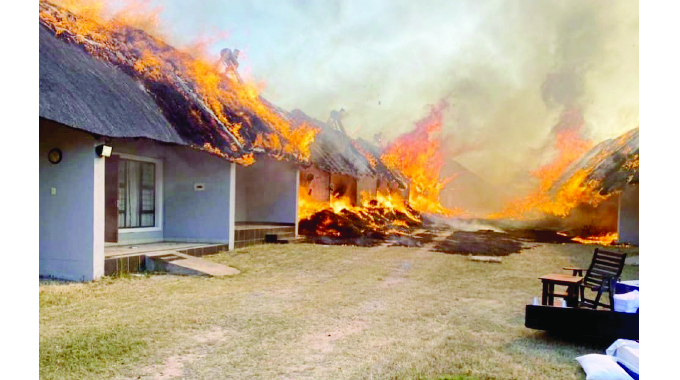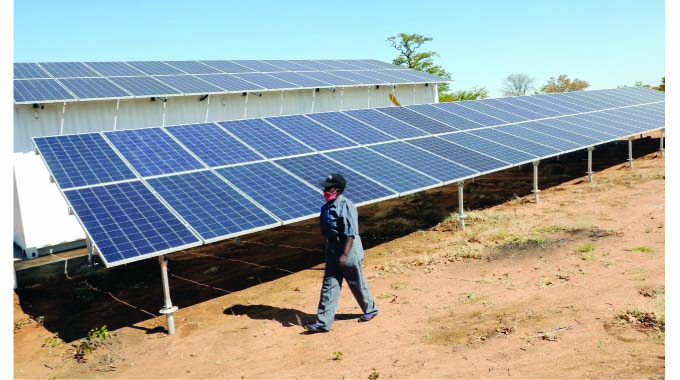More responsibility in veldfire management required

Fortunes Matutu
The risk of veld fires has significantly increased in Zimbabwe over the past years with vast tracks of land being burnt every year. Veld fires cause serious and significant damage to the environment, livelihoods, economic and social assets as well as human life.
Considering the persistence and increase of veld fires year after year, their causes and impact on communities and the environment, it is apparent that the management of fires needs to be reviewed.
The Government through various stakeholders has intensified veld fire management awareness campaigns to achieve the minimum target of 25 percent reduction in losses to veld fires in 2022 and ensure aspirations of the National Development Strategy (NDS1) are achieved.
However, the veld fire trends continue to increase. It would appear that raising awareness and prosecuting offenders are not sufficient deterrents to prevent veld fires from spreading.
Eighty-five percent of veld fires have occurred in resettlement and farm areas during this fire season while only 15 percent happened in protected areas.
The causes of veld fires are mainly ascribed to human activities associated with land-use systems and practices that are vulnerable to veld fires. Most fires start on farms and spread to surrounding veld where they become uncontrollable and subsequently cause extensive damage.
Increasing climate variability and the effects of climate change exacerbate the problem of veld fires. Dry spells are more frequent and delayed onset of rain is becoming more common.
The evidence is clear when travelling along any highway that veld fires are ravaging the country.
For example, Kombani Africa Lodge in Plumtree and Eland Lodge on the outskirts of Gweru were burnt after a veld fire got out of control. 60 000ha of grazing land in Beitbridge was destroyed by a veld fire that took place over a period of two weeks, in a place that rarely records veld fires. Also, an outbreak of veld fire in Dangamvura consumed five parked vehicles reducing them to shells. And most unfortunately an 80-year-old security guard died after failing to escape a ravaging veld fire at a Banket farm.
This loss and damage can be prevented with effective veld fire management planning with landowners taking the lead.
Resettled farmers and landowners are perceived as the major drivers of veld fires that eventually spread to other areas. Gone are the days when landowners in resettlement areas would be absolved on the basis that they do not have adequate equipment and knowledge on veld fire management.
It has been observed that a majority of farm owners are not fully committed to controlling veld fires. In spite of having knowledge on veld fire management, some claim they lack the resources to fully implement their veld fire management plans.
Close examination has shown that a significant number of plot holders are not complying with the veld fire pre suppression, suppression and post suppression measures. In some instances, farmers are only partially complying to set standards for veld fire management.
Partially complying is as bad as not complying at all since it offers a weak spot for fire to spread. A non-standard fireguard, for instance, isn’t effective in controlling veld fires as much as a firefighting team without all its equipment and technical ability are not any better than none at all.
Some land owners typically lack adequate manpower and are not mechanised to construct fireguards or carry out firefighting operations.
It is very common to find farms with lands ranging from 200 hectares to 2500 hectares with only two employees or just one cattle herder. The result is that most farm owners lack capacity to construct fireguards and are unable to put out veld fires.
The situation is generally each farm or each man for himself. When there’s a veld fire, some landowners opt to back burn the fire before it reaches their farms. Back burning must be a last-resort measure to stop veld fires from burning out a specific area but however, most are using it as their first line of defence. This results in large rangeland areas being sacrificed and burnt.
The law stipulates that everyone is obligated to help extinguish a veld fire within their vicinity, however neighbours often pass or look on as the veld fires burn through one farm.
An integrated and cooperative approach among landowners is one effective way for the prevention and putting out veld fires on farms. With some land owners having difficulty employing enough personnel and getting modern machinery to manage veld fires, landowners can form groups or associations to do the job.
A collective communal effort among farms in one vicinity can combat veld fires by combining their effort. The principal function of this system is to facilitate the emergence of veld fire management clusters that would be responsible for predicting, preventing, managing and extinguishing veld fires.
This approach can address socioeconomic dynamics, risk perceptions and needs while factoring in the potential and capabilities of local resources.
As a group, farms can work together for improved early warning systems, control of veld fire risk and putting up fireguards within their farm areas as a unit.
Likewise, landowners can put funds together to purchase equipment to help in veld fire management, such as blowers, fire beaters, drones, protective clothing, fire trucks and fireguard construction or renewal.
In the event of a veld fire on one farm, all members of one cluster can combine into one firefighting team and the affected farm would also be able to access additional resources to reduce potential losses.
Farms can also benefit from working in clusters with veld fire Government stakeholders providing the skills and material support.
Lastly, let us work together, share ideas and solutions on how to tackle the risk of veld fires.
Forests are our heritage – let’s not burn them!!!
Fortunes Matutu is a forester with the Forestry Commission and has a special interest in social forestry.











Comments